
Italian opera has long captivated audiences with its powerful emotions, exquisite melodies, and dramatic storytelling. For aspiring opera singers and enthusiasts, mastering the art of Italian opera is a journey that requires dedication, skill, and a deep understanding of its unique elements.
The History and Influence of Italian Opera
To truly appreciate and excel in Italian opera, it’s essential to understand its rich history and profound influence. Dive into the origins of Italian opera, from its birth in the late 16th century to the works of renowned composers such as Monteverdi, Puccini, and Verdi. Explore the evolution of different opera styles and the impact of Italian opera on the global music landscape.
Understanding the Elements of Italian Opera
Italian opera is a complex art form that combines music, singing, acting, and storytelling. Familiarize yourself with the key elements of Italian opera, including aria, recitative, ensemble, and chorus. Learn to analyze and interpret the libretto, identify vocal styles and techniques, and understand the dramatic structure that drives the narrative.
Developing Vocal Technique

A strong and versatile voice is essential for success in Italian opera. Invest time and effort in developing your vocal technique, working on breath control, resonance, range, and flexibility. Seek guidance from vocal coaches and teachers who specialize in opera to refine your technique and ensure proper vocal health.
Studying Italian Opera Repertoire
Immerse yourself in the vast repertoire of Italian opera. Study and analyze famous operas, such as “La Traviata,” “Rigoletto,” or “Carmen,” understanding the characters, their motivations, and the historical context. Explore lesser-known works to broaden your knowledge and repertoire. Attend live performances and listen to recordings by renowned opera singers to gain insights and inspiration.
Working with Language and Diction

Italian is the language of opera, and mastering its pronunciation and diction is crucial. Enroll in language classes or work with a language coach to develop fluency in Italian and refine your pronunciation. Pay attention to the nuances of the language, its vowel sounds, and the correct stress patterns to convey the meaning and emotion of the music effectively.
Embracing Acting and Stage Presence
Opera is not just about singing; it’s also about acting and creating a captivating stage presence. Study acting techniques to bring characters to life and convey their emotions authentically. Work on facial expressions, body language, and stage movement to engage the audience and enhance your performances.
Collaborating with Musicians and Conductors
Opera is a collaborative art form, and the ability to work harmoniously with musicians and conductors is crucial. Learn to navigate rehearsals, understand musical cues, and communicate effectively with the orchestra. Develop strong collaborative skills to create cohesive and memorable performances.
Read More: Top 10 Benefits of Virtual Private Networks In 2023
Exploring Performance Opportunities
Seek out performance opportunities to gain experience and showcase your talent. Audition for opera companies, participate in vocal competitions, and consider joining opera workshops and summer programs. Embrace every opportunity to perform and receive feedback to grow as an opera artist.
Embracing Technology in Opera
In the modern era, technology plays an increasingly significant role in opera productions. Familiarize yourself with digital recording techniques, live streaming platforms, and multimedia integration in opera performances. Embrace technological advancements to enhance your artistic expression and reach broader audiences.
Maintaining Physical and Mental Well-being
Opera demands physical stamina and mental resilience. Take care of your body through regular exercise, vocal warm-ups, and maintaining a healthy lifestyle. Prioritize mental well-being by managing performance anxiety, seeking support when needed, and finding a balance between work and personal life.
Conclusion
Mastering the art of Italian opera requires passion, perseverance, and a deep appreciation for the beauty of this art form. By understanding its history, developing vocal technique, studying repertoire, and embracing the many facets of opera, you can embark on a fulfilling journey of artistic growth and accomplishment. Stay dedicated, seek guidance from experts, and continue to explore and refine your skills to make your mark in the world of Italian opera.
FAQ
Q1: Do I need to learn Italian to master Italian opera?
A1: While it’s not mandatory, learning Italian is highly recommended to understand and convey the nuances of the language and the music effectively. It enhances your interpretation and communication with fellow musicians and audiences.
Q2: How can I find performance opportunities in Italian opera?
A2: Audition for opera companies, participate in vocal competitions, and explore opera workshops and summer programs. Networking with industry professionals and attending opera-related events can also lead to performance opportunities.
Q3: Is acting training necessary for opera singers?
A3: Acting training is highly beneficial for opera singers. It helps bring characters to life, convey emotions, and engage the audience. Developing acting skills enhances the overall performance and makes you a more well-rounded opera artist.
Q4: How can I stay motivated during the journey of mastering Italian opera?
A4: Set clear goals, celebrate milestones, and surround yourself with a supportive community of fellow musicians and mentors. Find inspiration in great opera performances, attend live shows, and remind yourself of the transformative power of this art form.
Q5: Are there opportunities to incorporate modern technology in Italian opera performances?
A5: Absolutely! Modern technology offers exciting possibilities for opera productions, including digital recordings, live streaming, and multimedia integration. Embrace these advancements to enhance your performances and reach wider audiences.











